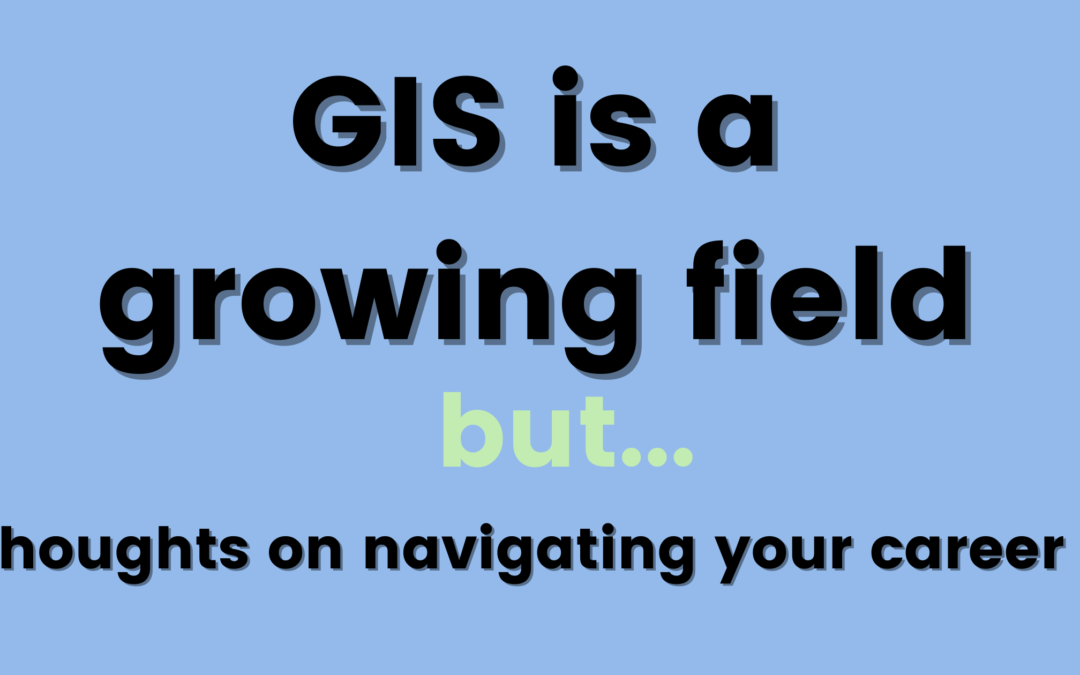How do I grow my GIS Career? Is one of the most common questions I get. My response:

GIS is a growing field… but
GIS is a growing field and needs many companies. The US Department of Labor Statistics estimates a 19% increase in jobs between 2016-2026. In my experience in the field over the past decade, GIS is becoming more of a norm. It used to be that I would talk with someone and try to explain what I did and they thought that I was like an ancient cartographer. Now, when I say I “make maps” it is more common for someone to say “oh, you do GIS?” Despite more people becoming aware of the field and the projected growth, I have a few caveats to a statement of the general growth of the field:
- How are you defining GIS? Are you equating GIS with esri? Or does GIS in your mind mean anything with a map and can include QGIS, Carto, Mapbox, and even Tableau. I think that this is an important distinction. The rise of cloud-based GIS applications has democratized access to GIS and it is becoming more and more integrated into business processes. Being able to apply spatial concepts now requires more creativity and an ability to adapt to changing circumstances than was previously required. Knowing GIS now means that you have the ability to think geographically.
- Do you want to use GIS in your job as a tool or do you want your job to be primarily GIS? For about five years I worked in research and development where GIS was the primary tool (but not only tool) that I used in completing my work. I love GIS and I loved the ability to apply GIS in a variety of contexts. One of the things that made me good at GIS was also the fact that I have training in urban planning, environmental science, and political science. I was able to apply that subject matter expertise to GIS projects. I left that job and I took a role at a fancy consulting company as their Senior GIS Specialist. For me, one of the things that were hard about that position was that it was a 100% GIS position. I didn’t really get to apply my outside knowledge in that role and it was really hard for me. One of the reasons that I started my own company was my desire to do what I call “GIS Plus…” I learned in my fancy consulting job that I want to be able to apply my skills beyond GIS to providing geographic solutions. There is no right or wrong answer to this question. This is just something that you need to think through. In my ideal world, there would be a small number of GIS nerds (like me) whose primary employment is in GIS. Then there would be a huge portion of the workforce that used GIS occasionally to complete tasks. One way to think about it is that many people are ok at doing Excel. But then there are people who are amazing at doing Excel– doing Pivots and writing macros. In my ideal world, basic geospatial skills would be as ubiquitous as basic Excel skills.
- GIS is no longer just based on the desktop. One of the biggest trends that I have seen emerge over the past three years is that more and more GIS analysis is moving towards the web. People want to interact with GIS data and do their own analysis. If you look at GIS job postings, you will see that a growing number involves a need to automate.
Ways to gain additional skills
So you see the value in growing in your GIS career and you want to keep growing. What are some ways that you can grow?
- Join Networking Groups: Use Meetup to find what mapping/ GIS meet-ups are in your area. When I lived in DC there were SO many options for GIS meet-ups. With the move to the online world, I started hosting regular Mappy Hour events. If you’re a woman I highly recommend the Women in GIS networking group; I have gotten some of my best business advice from members of the LinkedIn group and through mentors, I found on the site. (As a note I have a LinkedIn workshop that I run a few times a year. If you’re interested you can express your interest here).
- Get additional training: At Tabuale Spatial, we are proponents of lifelong learning, and that you should always be seeking to learn new skills. When you think about training solutions I think that there are two important aspects. First, As you get the opportunity to APPLY what you are learning? Second, are you being taught to think geographically? There are plenty of training offerings out there to learn GIS, however, I don’t think that they are all created equal in these regards. That is a large reason why Tabulae Spatial offers training because we see that there is a gap in the market. We are working to expand our offerings. Please reach out if you have a specific training need.
- Get Personalized Career Support: The team at Tabulae Spatial is invested in the future of the geospatial industry. We are networked and have the pulse of the GIS industry and education. And so we are pleased to offer a new unique in the industry GIS career consulting option. We have a unique coaching program that has been successful in helping many people navigate their careers.
Please let us know what you think in the comments below or by shooting us an email. We will be expanding this series with other posts on the GIS job market and would love suggestions on what to post.
